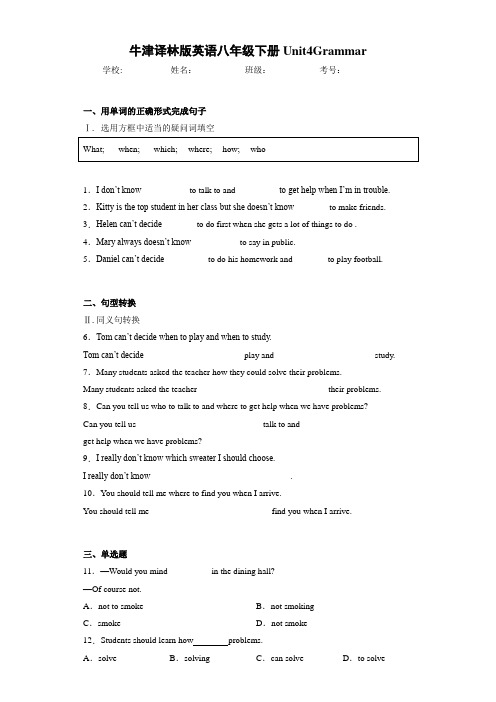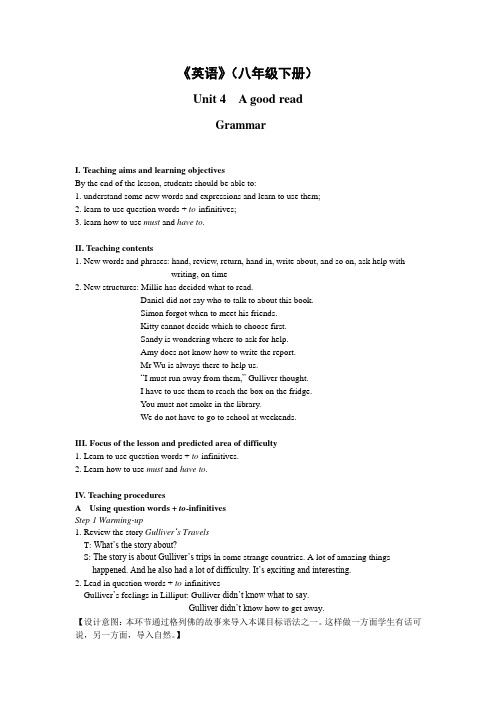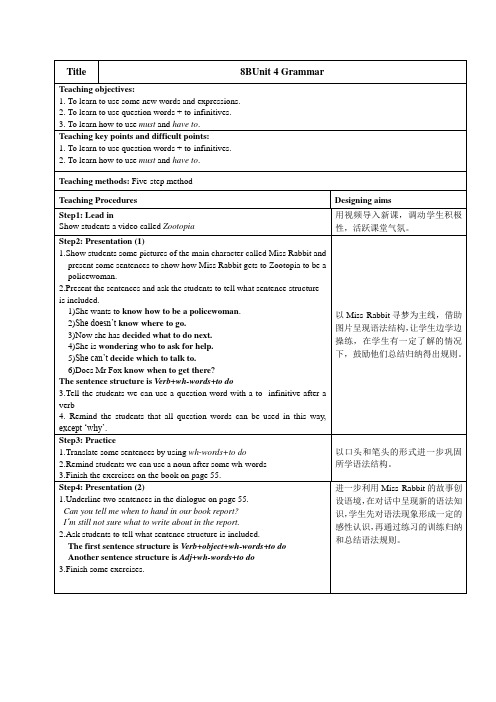新牛津译林版八年级英语下册Unit 4 Grammar导学案
牛津译林版英语八年级下册课时练习 Unit 4 Period 4 Grammar

Unit 4 A good read第 4 课时Grammar一、根据句意和中文提示完成单词。
1. You should ________ (归还) the books to the library on time.2. The students asked their teacher when to ________ ________ (上交) their homework.3. With ________ (知识) , we have conquered nature and invented steamers, trains and airplanes.4. If you want to keep the books longer, you have to ________ (续借) them.5. You should read some ________ (评论) about the film before watching it.二、根据句意, 用括号中所给单词的适当形式填空。
1. When did you learn ________ (ride) a bike?2. I can't decide when ________ (start) our travel to Shanghai.3. I hope you can choose me ________ (be) the host4. But I don't know where ________ (buy) a book for her.5. It's raining. Why not ________ (take) a raincoat with you?6. —Has the plane arrived yet? —Yes, it has. It ________ (arrive) about twenty minutes ago.7. — How much should I pay? —18 yuan in all, ________ (include) the pen you picked out just now.8. We’ve worked for a long time. Let's stop ________ (have) a rest.9. Nothing is ________ (possible) . It means everything can happen if you make efforts.10. He got what he deserved, but we have a long way ________ (go) .三、单项选择1. If you don't know ______ , please come to me.A. who to talkB. what to talk withC. who to talk toD. what to talk2. I haven't finished reading the book. May I ______ it for a few more days?A. returnB. borrowC. lendD. keep3. —Is this blue schoolbag Lucy's? —No. It ______ be hers. Her schoolbag is pink.A. mustB. mustn'tC. canD. may4. —In China, many students feel stressed because of too much homework. —Don't worry. Our government has realized this problem. I'm sure there ______ be good news for them soon.A. canB. mustC. shouldD. need5. —Mum, ______ I do my homework tonight? —No, you ______ . But you must finish it before Sunday.A. need; mustn'tB. must; needn'tC. must; mustn'tD. may; can't6. You ______ smoke here! Look at the sign It says "No smoking".A. needn'tB. mustn'tC. canD. may四、根据短文内容和所给首字母, 在空格内填入一个适当的词, 使短文意思完整。
牛津译林版英语八年级下册Unit4Grammar(答案+解析)

22.Johnny, you ___________play with the knife , for you may hurt yourself.
A.won’tB.can’t
C.mustn’tD.needn’t
四、选用适当的单词补全对话
A.amB.to be
C.will beD.be
19.—I like the party so much , but I _________go home. It’s too late.
—What a pity!
A.mustn’tB.have to
C.mayD.can’t
20.—Must I come at four o’clock?
8.Can you tell us who to talk to and where to get help when we have problems?
Can you tell us___________________________talk to and________________________get help when we have problems?
—Oh, no you ____________.
A.don’tB.mustn’t
C.don’t have toD.can’t
21.—Must I finish my homework tonight?
—_________________.
A.Yes, you canB.No, you needn’t
4.Mary always doesn’t know_________to say in public.
初中英语八年级下册(牛津译林版)Unit4Grammar教学设计

-学生分享自己在本节课的学习收获,提高他们的反思能力。
2.语法规则总结:
-教师通过提问方式,引导学生总结一般将来时的语法规则。
-学生用自己的话复述语法规则,加深对知识点的理解。
3.课后任务布置:
-布置与未来相关的写作任务,要求学生运用一般将来时。
2.学生英语水平:经过前两年的英语学习,学生已具备一定的英语基础,掌握了一般现在时、一般过去时等基本时态。但在实际运用中,对一般将来时的掌握程度仍有待提高。
3.学生学习习惯:部分学生习惯于被动接受知识,缺乏自主学习能力。在教学过程中,教师需关注学生的学习方法,引导他们养成良好的学习习惯,提高学习效率。
-分享在学习本章节过程中的心得体会,包括对一般将来时理解上的突破和学习方法的改进。
作业布置时,教师应提醒学生注意以下事项:
-完成作业时,要注重语言表达的准确性和流畅性。
-主动发现并纠正自己在语法运用上的错误,提高自我纠错能力。
-养成良好的学习习惯,按时提交作业,培养责任感和自律性。
-在作业批改中,关注学生对一般将来时的掌握程度,给予有针对性的反馈。
7.拓展与延伸:
-鼓励学生课后阅读与未来相关的英语文章、书籍,提高他们的阅读兴趣和水平。
-组织英语角活动,让学生在实际交流中运用一般将来时,提高他们的口语表达能力。
四、教学内容与过程
(一)导入新课
1.教学活动设计:
-利用多媒体展示一组关于未来科技的图片,如自动驾驶汽车、智能家居等,引发学生对未来的思考。
-设计有针对性的练习题,包括填空、选择、改错等,帮助学生巩固所学知识。
5.作业布置:
-布置与未来相关的写作任务,如写一篇关于未来职业规划的文章,要求学生运用一般将来时。
牛津译林版英语八年级下册U4 Grammar 教案

《英语》(八年级下册)Unit 4 A good readGrammarI. Teaching aims and learning objectivesBy the end of the lesson, students should be able to:1. understand some new words and expressions and learn to use them;2. learn to use question words + to-infinitives;3. learn how to use must and have to.II. Teaching contents1. New words and phrases: hand, review, return, hand in, write about, and so on, ask help withwriting, on time2. New structures: Millie has decided what to read.Daniel did not say who to talk to about this book.Simon forgot when to meet his friends.Kitty cannot decide which to choose first.Sandy is wondering where to ask for help.Amy does not know how to write the report.Mr Wu is always there to help us.“I must run away from them,” Gulliver thought.I have to use them to reach the box on the fridge.You must not smoke in the library.We do not have to go to school at weekends.III. Focus of the lesson and predicted area of difficulty1. Learn to use question words + to-infinitives.2. Learn how to use must and have to.IV. Teaching proceduresA Using question words + to-infinitivesStep 1 Warming-up1. Review the story Gulliver’s TravelsT: What’s the story about?S: The story is about Gulliver’s trips i n some strange countries. A lot of amazing thingshappened. And he also had a lot of difficulty. It’s exciting and interesting.2. Lead in question words + to-infinitivesGulliver’s feelings in Lilliput: Gulliver didn’t know what to say.Gulliver didn’t kn ow how to get away.【设计意图:本环节通过格列佛的故事来导入本课目标语法之一。
牛津译林版英语八下Unit 4《A good read》(Grammar)教学设计

牛津译林版英语八下Unit 4《A good read》(Grammar)教学设计一. 教材分析《A good read》是人教版牛津译林英语八年级下的一个单元,主题是关于书籍和阅读。
本课的主要内容是通过介绍两本书的评价,让学生学会如何使用过去时态和现在时态描述事件的顺序。
教材中包含了丰富的阅读材料,有助于提高学生的阅读兴趣和阅读能力。
二. 学情分析学生在学习这个单元前,已经掌握了动词的过去式和现在式的变化规则,同时也具备了一定的阅读理解能力。
但学生在阅读长篇文章时,可能会遇到生词和难句,影响阅读理解。
因此,在教学过程中,需要帮助学生克服这些困难,提高他们的阅读能力。
三. 教学目标1.知识目标:学生能够正确使用过去时态和现在时态描述事件的顺序。
2.能力目标:学生能够读懂文章,提高阅读理解能力。
3.情感目标:激发学生对阅读的兴趣,培养良好的阅读习惯。
四. 教学重难点1.重点:学生能够正确使用过去时态和现在时态描述事件的顺序。
2.难点:学生能够读懂文章,提高阅读理解能力。
五. 教学方法1.任务型教学法:通过完成各种任务,激发学生的学习兴趣,提高学生的参与度。
2.互动式教学法:教师与学生,学生与学生之间的互动,促进知识的传递和能力的培养。
3.情境教学法:创设情境,让学生在真实的环境中学习,提高学生的应用能力。
六. 教学准备1.教师准备:准备好教材、多媒体教具、教学卡片等教学资源。
2.学生准备:学生提前预习课文,了解文章大意。
七. 教学过程1.导入(5分钟)教师通过提问方式引导学生谈论他们喜欢的书籍和阅读体验,激发学生的学习兴趣。
2.呈现(10分钟)教师通过多媒体展示两本书的评价,让学生听懂并理解文章的内容。
3.操练(15分钟)学生分角色朗读文章,模仿文章中的评价语言。
教师引导学生运用过去时态和现在时态描述事件的顺序。
4.巩固(10分钟)学生分组讨论,总结文章的主旨大意,并用自己的话进行表达。
教师巡回指导,纠正学生的错误。
Unit4Grammar教案牛津译林版英语八年级下册

A. on timeB. in timeC. at timesGrammar考点1 疑问词+动词不定式一“疑问词+动词不定式”可在句中用作宾语、主语和表语。
eg:Can you tell me how to spell the word?你能告诉我怎么拼写这个单词吗?How to go there is a question.如何去那里是个问题。
二【重点】疑问词+动词不定式"作宾语是初中阶段的重点。
在"疑问词+动词不定式”结构中,只有疑问词why不能与不定式连用。
有些疑问词,其后可先接名词再接动词不定式。
作宾语时,此结构常用于know, learn, see, hear, ask, tell,advise, decide, explain, find out, forget, remember, think, understand, wonder 等动词或动词短语中。
也可用于sure,clear等形容词之后。
eg:The teacher is telling the students what to do.老师正告诉学生们要做什么。
Have you found out what time to start?你査淸楚什么时间开始了吗?I am not sure which way to take.我不确定走哪条路。
【测一测】—I’ll have a tenday holiday. But I don’t know一How about Paris?A. what to doB. where to goC. when to go考向三:“疑问词+动词不定式”结构可以改写为该疑问词引导的从句。
eg:We do not know what to do. = We do not know what we should do.我们不知道该做什么。
考点二must和have to一【重点】:must的用法must为情态动词,后接动词原形。
牛津译林版英语 8B八年级下册Unit4Grammar教案

1. To learn to use questionwords + to-infinitives.
2. To learn how tousemustandhave to.
Teaching methods:Five-step method
5.Show students two more library rules.
a.Peoplemustn’tsmoke in the library.
b.Peopledon’t have topay for the book in the library.
6.Explain tothe studentswe use ‘must not’ to saysomething is not allowed.. We use ‘do not have to’ to say that it is not necessary to do something.
以Miss Rabbit寻梦为主线,借助图片呈现语法结构,让学生边学边操练,在学生有一定了解的情况下,鼓励他们总结归纳得出规则。
Step3:Practice
1.Translate some sentences by usingwh-words+to do
2.Remind students we can use a noun after some wh-words
7.Make a conclusion
继续利用Miss Rabbit的故事,创设语境,自然引出must和have to。将语法项目放入真实的情境中,让学生先形成一定的感性认识,然后在情境中体会语法的意义与功能。
2021年牛津译林版八年级英语下册Unit 4 Grammar导学案.doc

优质资料Unit 4 Grammar导学案课前参与一、预习书本P54-56,完成书本上的练习。
二、重难点解析:1.我们可以用“疑问词+动词不定式”结构作动词的宾语。
疑问词有:what, which , who, how, when, where .常和这一结构连用的动词有:know, learn, see, hear, ask, tell, advise, decide, explain, find out, forget, remember, think, understand, wonder等.I don’t know _______ _______ __________ next.我不知道接下来说什么.I can’t decide ________ ________ _________ _______.我不能决定选哪个.有些动词,如:advise, ask, show, teach, tell可以接双宾语.Please tell________ _______ _______ ________there. 请告诉我怎么去那儿。
有些疑问词,如:what, which , whose, how many, how much可以先接一个名词,再接动词不定式。
She wondered _______ ________ _________ _______ ________. 她不知道选哪几门学科。
2.must表示主观的义务和必要,主要用于肯定句和疑问句,意思是“必须,得,要”。
否定形式mustn’t表示禁止,意思是“不能,不许”。
如:你今天必须完成作业。
You _______ _______your homework today.你不能在这里抽烟.You _______ _________ here. have to表示一种客观的需要,意思是“不得不”。
have to 有人称和数的变化。
否定形式是don’t have to。
- 1、下载文档前请自行甄别文档内容的完整性,平台不提供额外的编辑、内容补充、找答案等附加服务。
- 2、"仅部分预览"的文档,不可在线预览部分如存在完整性等问题,可反馈申请退款(可完整预览的文档不适用该条件!)。
- 3、如文档侵犯您的权益,请联系客服反馈,我们会尽快为您处理(人工客服工作时间:9:00-18:30)。
Unit 4 Grammar导学案课前参与一、预习书本P54-56,完成书本上的练习。
二、重难点解析:1.我们可以用“疑问词+动词不定式”结构作动词的宾语。
疑问词有:what, which , who, how, when, where .常和这一结构连用的动词有:know, learn, see, hear, ask, tell, advise, decide, explain, find out, forget, remember, think, understand, wonder等.I don’t know _______ _______ __________ next.我不知道接下来说什么.I can’t decide ________ ________ _________ _______.我不能决定选哪个.有些动词,如:advise, ask, show, teach, tell可以接双宾语.Please tell________ _______ _______ ________there. 请告诉我怎么去那儿。
有些疑问词,如:what, which , whose, how many, how much可以先接一个名词,再接动词不定式。
She wondered _______ ________ _________ _______ ________. 她不知道选哪几门学科。
2.must表示主观的义务和必要,主要用于肯定句和疑问句,意思是“必须,得,要”。
否定形式mustn’t表示禁止,意思是“不能,不许”。
如:你今天必须完成作业。
You _______ _______your homework today.你不能在这里抽烟.You _______ _________ here. have to表示一种客观的需要,意思是“不得不”。
have to 有人称和数的变化。
否定形式是don’t have to。
天快黑了。
他现在得回家了。
It’s getting dark.. He ______ ______ _______ home now.他们目前没必要买电脑。
They _______ _______ _______ _______ a computer now..课中参与一、根据句意及首字母或汉语提示完成单词1. Much __________________ (advise) has been given to teenagers.2. Our _______________(stomach) can be worse if we don’t have healthy diets.3. In the _______________(begin), he thought he would never remember all the words.4. She wanted to c___________ working after she got married.5. Please put the piano there, a____________ the wall.6. You should read some r_____________ about the book before _______________(write).7.____________(递,交)in your homework as soon as possible.8.Lucy hasn’t finished reading the book, so she wants to __________(续借)it.9._____________(无论如何),I know who to ask for help with maths homework.10.Peter is _______________ (想知道)where to borrow a book.11.Do your classmates like reading _________________ (小说)?12. Most _____________(Germany) are very honest and serious.二、单项填空( )1.Our maths teacher seldom drives to work, ______________?A. doesn’t heB.isn’t heC. does heD. is he( )2.This book __________ Lucy’s. Look, her name is on the book.A. must beB. may beC.can’t beD.mustn’t be( )3.—Must I finish the work this afternoon? –No, you ________.A. mustn’tB. needn’tC.can’tD.may not( )4.It was __________ that she went out for a swim.A.so a fine weatherB. so fine weatherC. such a fine weatherD. such fine weather ( )5.--_________ the flowers when I’m away. –OK, I will.A. Forget to waterB.Forget wateringC.Remember to waterD. Remember watering ( )6.—With 3G mobile phones, people can even see each other as they talk.---Really? Would you show me _______________it, please?A.how to useB. when to useC. where to useD.what to use( )7.Peter showed great __________ in these places of ___________.A.interest, interestB.interest , interestingC.interested ,interestingD.interesting, interesting ( )8.Gulliver __________ to get away from the small house , but failed.A. managed B continued C shouted D. crashed( )9.When I saw Peter, he was standing _______ the wall, reading a book.A. withB. beforeC.againstD. on( )10.The twins couldn’t stop ________ the TV as soon as they got home. The basketball match was still ________.A. to turn on, playingB. turning on , playingC. to open , havingD. turning on, on三、动词填空1. The microphone can make your voice __________ (sound) louder.2. Mr Brown likes children very much, he ______________ (write) a children’s book these days.3. It’s every student’s job ___________ (work) hard for our country.4. It’s 6:30. Look! The sun ______________ (rise).5. My father _____________ (go) to Japan. He__________ (be) there for another month.6. Kitty is wondering where ___________ (ask) for help.7. She _______ (have ) _____________ (look) after her daughter every day.8. The rain continued ___________ (rain ) all the afternoon.9. How did he manage ___________ (get) there?10 .I didn’t know what ____________ (say) to the student.四、根据汉语意思完成句子1.他们得记住什么时候应该交作业。
They have ________ ________ ________ ______ _______ _______ their homework.2.你清楚向谁征求意见吗?Are you _______ who ________ ask ________ ________?3.你可以问父母你能带多少钱。
You can ask your parents ______ ______ ________ _______ ________ _____you .4.我直到父母亲下班回来才睡觉。
I __________ _________ to bed ________ my parents _________back ________ work.5.每次来图书馆时,你得带上你的图书证。
You ______ ______ _______ your library card ________ ________ you come to the library. 6.你的鞋和我的一样大小。
Your shoes are _________ _________ _________ ________ __________.五、句型转换1.I want to know how I can work out the problem.(同意句)I want to know _______ _______ ________ ________ the problem.2.I can’t decide when I should do homework and when I can spend time on hobbies. (同意句)I can’t decide _______ ______ _____homework and ______ ______ ______time on hobbies.3 How we should do it was discussed last night.(同意句)_______ ________ ________ ________ was discussed last night.4.He found he could not lift his hands(同意句)He ________ __________ __________ ________ ________ his hands.。
